#ME/CFS affirmations
Explore tagged Tumblr posts
Text
🌿 Today, I wholeheartedly embrace adaptability, finding strength in my inherent flexibility.
In navigating the complex journey of life with chronic illness, I discover the potential to thrive amidst change. Each shift becomes an opportunity to adapt gracefully. As I navigate uncertainties, I embrace resilience. Understanding and flexibility is not a compromise but an integral part of my path. Today, I understand that my daily challenges can lead to a deeper experience of resilience and…
#MECFS#chronic fatigue#chronic fatigue coping strategies#chronic illness#Compassion#Inner peace#loving-kindness#ME/CFS#ME/CFS affirmations#ME/CFS coping strategies#meditation#Mindfulness#Myalgic Encephalomyelitis#non-duality#Self-Realization#Spiritual Awakening#spiritual growth#spiritual journey#Spiritual Practice#spirituality#wisdom
0 notes
Text
The difference between day clothes and night clothes is made up btw. You can do whatever you want forever
#I mean I probably wouldn’t wear jeans to bed#but cozy home clothes and pajamas are the same#my post#original post#bed rotting#chronically ill#chronic illness#disabled#disability#social constructs#me/cfs thoughts#disability affirmations#affirmations
22 notes
·
View notes
Text
anyway. Vic Fuentes images be upon ye.




#I posted smth on my cf story the other day abt how I have like crazy gender envy for him#& two (2) separate people responded to say smth along the lines of “dude you literally look like him”#Those ppl don’t know each other AND neither of them listen to ptv either so that was a super gender affirming moment for me
0 notes
Text
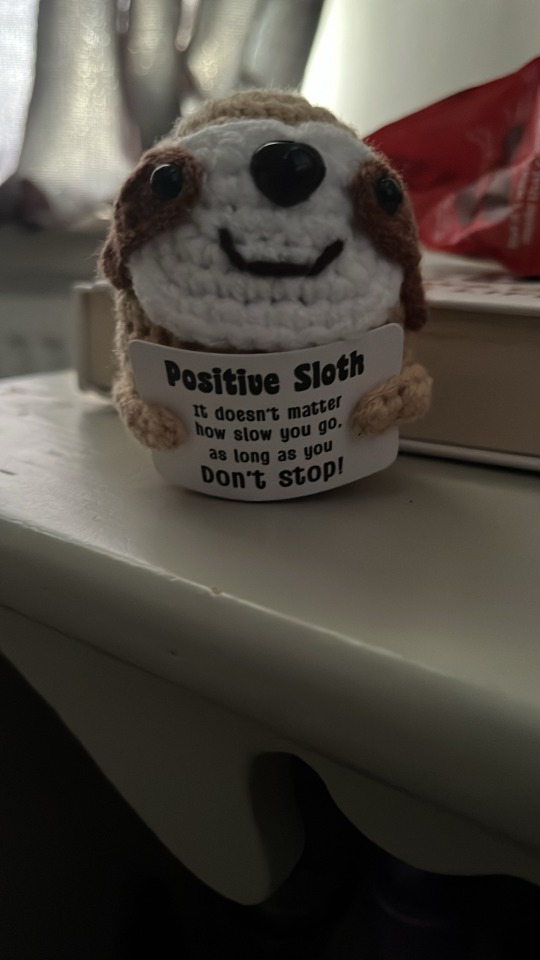
pOsiTiVe ViBeS..
#positive vibes#positive thinking#positive thoughts#positivity#positive affirmations#powerful#cute#sloth#me cfs
1 note
·
View note
Text
Proposing new meanings for the Disability Pride Flag stripes

I love the design of the disability pride flag made by @capricorn-0mnikorn (in consultation with many disabled people!). It’s beautiful, elegant, and distinct. I love the symbolism of the diagonal stripes.
But the more I think about the meanings of the five diagonal stripes, the more uncomfortable I am with them. So I'll explain my discomfort and then give proposed alternative meanings.
For those unfamiliar, these are the meanings that capricorn-0mnikorn gives:
The White Stripe: Invisible and Undiagnosed Disabilities
The Red Stripe: Physical Disabilities
The Gold Stripe: Neurodivergence
The Blue Stripe: Psychiatric Disabilities
The Green Stripe: Sensory Disabilities
With additional and helpful context here! 💙 Like a lot of disabled people my disabilities don't all fit neatly into these boxes, but I recognize some disabled people see themselves in these categories. I do appreciate the symbolism of it being the most common flag colours / internationalism plus the intent of representing diversity amongst the disability community.
Here’s what doesn’t sit well with me:
The yellow was chosen for the neurodiversity stripe because gold = Au = autism (and also as a fuck you to autism speaks, a sentiment I agree with 💯).
So autism is used to represent all of neurodiversity. Even though the 2018 AutisticsUK campaign to associate gold with autism was explicitly motivated by the idea that neurodiversity is larger than just autism and autistic people should have our own colour/symbol distinct from the rainbow infinity used for general neurodiversity.
One specific disability is effectively being given a whole stripe (autism) while the other four stripes are based on abstract ideas: red is associated with body -> physical disability, blue is associated with the mind (and is “opposite” to red) so -> mental disability. This is reasonable but it’s inconsistent. (And I am very much the kind of autistic who gets bothered by internal inconsistency 😅)
The Deaf community has been using cyan blue for ages (since at least 1999, probably older) and they have been so vital in disability rights history. I feel if any single disability deserves to get an entire stripe to themselves it should be them.
I appreciate the honestly that assigning green to sensory disabilities was because “that was the color that was left over” but it still feels wrong given how vital blind & deaf people have been to disability history.
Blue for mental/emotional disabilities also misses that the Mad Pride movement has been using purple as their colour since at least 2013.
If all five stripes were disconnected from actual disability-specific pride flags I think I’d be okay with it. What sets me off is the inconsistency: autism gets the privilege of its own chosen colour but not other disabilities? (Also: autism isn’t the only disability that uses yellow!)
My proposal for new meanings
I propose each stripe represent a different cause of disability, and the associated model(s) of disability that go with that cause:
Red: disability due to injury / the debility model of disability - e.g. injury due to armed conflicts caused by colonialism, injury due to gun violence in a country which fails to regulate gun safety, preventable illness due to sociopolitical neglect 😡🩸
Yellow: disability due to natural differences / affirmative models of disability - e.g. autistic people who lead lives that take advantage of their autistic traits, DSPS folks who are able to work night shifts and take pride in doing so 😄🌟
Blue: situational disabilities / critical models like the social model, social construction model, political/relational model, and radical model - e.g. a Deaf person who feels their only disability is that people don’t speak their signed language and don’t provide captions/etc 🗣️♿️
Green: disability due to illness / biomedical models of disability - e.g. people with conditions like ME/CFS and Long Covid who actually do want to be treated/cured 🤢🦠 [edit 2025-06-30: fyi there is a newer proposal where the green instead means the political minority model!]
White: disability caused by unknown or other factors / other models such as the human rights model - e.g. somebody with a poorly-understood and/or undiagnosed illness who is fighting for access for accommodations and medical care 👀🤍
People may relate to multiple stripes! Whether it’s for the same disability or for having multiple disabilities. Like the old meanings, the intent is to showcase our internal diversity. 🌈
It’s been my experience of disability community that attitudes about disability tend (in general) to be linked more to when/how we were disabled rather than mental/physical/sensory/etc. For example, people like me who were disabled from a young age tend to understand our disabilities differently than people who acquire disability later in life.
Colour choice justifications:
Red as disabilities caused by injury: keeping with capricorn-0mnikorn’s association of red with the body plus the common associations of red with blood, violence, and anger. I want to explicitly include the debility model of disability because a lot of white disabled people tend to forget or gloss over how disability is used as a weapon against racialized & Global South folks.
Yellow is associated with optimism and pleasure as well as enlightenment (such as in the Deaf flag) and so I connect it to the affirmation model of disability (which is the opposite of the charity/tragedy model). From there I associated it to disability due to natural differences, such as congenital neurodivergence. I want yellow to still be something that fellow autistics could still see themselves in the flag for! 💛 And I want intersex people who see their intersex variation as a disability to be able to see themselves here too because being intersex is natural 💛
Blue as disabilities that are social/situational in nature, like Deafness being a disability in situations where signed languages are unavailable. I wanted Deafness to actually be under blue this time. 💙
Blue has also been used for disability writ large for a long time now and so this one being the one associated with the Social Model feels most historically connected to me. I’m also including newer critical/postmodern models like the social construction model and radical model which also posit that disability is a social category rather than a deficiency of individuals’ bodyminds.
The social model is generally contrasted with the medical model - viewing disability as a medical problem. A lot of disability activism is focused on de-medicalizing our bodyminds and challenging the idea that we want to be cured.
But there are chronic illnesses like ME/CFS, long covid, and cancer where the people who are disabled by them do actively (and vocally) want to be cured! And they belong to the disability community too. Green was picked for illness because green has been used to symbolize sickness (e.g. the ���� emoji). And biomedical models like the traditional medical model and the more recent biopsychosocal model are thematically connected to disability being due to illness [edit 2025-06-30: fyi there is a newer proposal where the green means the political minority model!]
For white, I want people who are undiagnosed and/or who feel the invisibility of their disability as important to again be able to see themselves in this stripe. 🩶White is also the catch-all “other models” because of white being the sum of all colours in an additive colour model. Models like the human rights model I see as being appealing to disabled people who are feeling invisibilized by society.
For each stripe I've included both a cause of disability and a model of disability. The causes are concrete, and easy to understand. The models of disability are more abstract and not everybody will know them (especially ableds). But a flag gives us an opportunity to teach others about us and I think it's a great opportunity to increase awareness of the different views/models of disability. 🖤
Overall, I tried to keep as much of capricorn-0mnikorn’s reasoning/associations alive in my new proposed meanings as I could. 💜 I hope people who see themselves in a given stripe of the original flag will see themselves in this scheme as well. I hope people who didn’t see themselves in the original scheme find these options more inclusive. ☮️
#disability pride#disability#disability pride flag#flag meanings#colour meaning#disabled pride#pride month
363 notes
·
View notes
Text
So... when conservative dorks called me a low T, soyboy cuck, it turns out they were accurately diagnosing me.
When you have CFS and Narcolepsy fighting each other inside your body, it is very hard to detect new symptoms from alternate maladies. But I've been in bed with a huge slump for the past 8 weeks and this just seemed much more intense and my brain has been way foggier than my normal CFS amount.
So on a whim, I asked my doctor to test my testosterone. It seems it has dipped quite low. And suddenly a lot of the symptoms I've been feeling make lot more sense. The poor sleep. The poor temperature regulation that was actually hot flashes. The exhaustion and brain fog.
It looks like I'm going to be needing some gender affirming care. But for me it will be covered by insurance and in no way threatened by bigotry. But hopefully my injections will help me feel good enough to fight for *everyone* to have continued access to this.
I'm scared and anxious. I worried about why this happened. I'm worried about side effects. The last time I tried testosterone was in my 20s and I just had constant boners. I'm too old and too tired to be dealing with that. Hopefully it will just be a normal amount of boners now that I am in my 40s.
I'm trying to manage my expectations. New medicines can be helpful but they can also introduce new problems and complications. But hopefully I will start feeling a lot better as I get treatment.
150 notes
·
View notes
Note
i love your works!! Sooo... I was wandering if you could do a small thing about a reader with ME/CFS (more commonly known as chronic fatigue syndrome). It's a horrible condition to deal with as someone who likes to do dance and cheerleading... muscle pain that takes forever to go away,. constant exhaustion paired with insomnia and more...
I was thinking like a fluffy ass comfort fic with reader x sirius black? or any of the maruders.. with a twinge of reader pushing their self to do too much? Of course, only if you have time <3 MWAH <3<3
Thank you for the compliment, and I really hope you enjoy this!
Pairing: Sirius Black x Reader Summary: Sirius comforts you when you push yourself too far. Tags: disabled!reader, depictions of chronic fatigue, exhaustion crash, reader's body not cooperating, reader's frustration with limitations, hurt/comfort, soft!sirius, sirius takes care of you, affirming love in illness, emotional intimacy, use of y/n, chronic illness as a character, reader has a complicated relationship with their body, warm domestic moment, exhaustion as a second skin, dance as escape, comfort through presence, sirius being the softest bastard alive Word count: 1.2k words.

You don't mean to overdo it. Really, you don't. But the rhythm of movement, the throb of music through your body—it's easy to lose yourself in the stretch and leap of limbs, in the exhilaration of exertion. Dance has always been your refuge when words feel inadequate. Cheerleading, too—the high energy, the precision, the thrill of performing. It feels like freedom. Like fire. Like claiming space in a world that sometimes seems determined to make you small.
But today, your body is adamant that there are limits.
You sit on the edge of your bed, legs trembling slightly, arms feeling strangely heavy. Sweat still clings to your skin even though you stopped practicing routines over twenty minutes ago. The headache pulses in time with your heartbeat, a dull ache that grows sharper with each passing second. That familiar fog is creeping into your mind, blanketing thoughts and making every breath feel like work. Your skin feels too tight, too hot—exhaustion wrapping itself around you like a second skin, one that sleep won't peel away. There's a strange buzzing beneath your skin, a dissonance in your muscles that makes it hard to even lift your arms. Your joints ache, your vision blurs at the edges, and each movement feels like wading through molasses.
This is the part you hate.
The door creaks open, a sliver of light piercing the dim room. Your heart recognises the footfall even before your mind does—it's Sirius. He never knocks, not when it comes to you. His presence fills the space like a silent song, threading through the air with an ease born of intimacy.
"Hey, sweetheart," he murmurs, the word barely more than a breath. His voice is an anchor in the shifting darkness, something real amidst the ghosts of your thoughts. You glimpse his silhouette in the doorway—tall, solid, unyielding—before your eyes drift shut again.
When you open them, he's closer, kneeling at the side of your bed. The worry lines etched into his forehead stand out starkly against his pale skin. His hair is dishevelled, as though he's been raking his fingers through it, and the collar of his shirt is stretched thin from wear. It's one of yours—the one you always steal back from him after laundry day.
A weak smile tugs at your lips, but it falls flat, the effort too great. "I'm fine, Sirius," you whisper, the words brittle and hollow.
His hands reach out, tentative and careful, to clasp your own against the cool fabric of the blanket. His touch is warm and steady, fingers calloused from years of wandwork but somehow always soft when they touch you. For a moment, you let yourself lean into the solace he offers, his heartbeat a soothing lullaby against the storm within.
"You don't have to pretend with me, love," he murmurs. The words are thick with a quiet understanding that winds its way around the hollow spaces within you, seeking to fill them with something other than pain.
You swallow hard, eyes stinging as they dart away from his gaze. "I just... I wanted to get it right. The routine. I was so close. If I could've just—"
"Y/N." Sirius's voice is a soft plea, filled with an ache that mirrors your own. He leans forward, resting his forehead on your knee, his breath warm through the thin fabric of your pyjamas. "You don't have to prove anything to anyone, least of all me. You're already the most incredible person I know, and you're trying so damn hard. That's more than enough."
Your chest tightens, and you take in a shaky breath, not trusting yourself to speak. He lifts his gaze to meet yours, his eyes reflecting an unshakeable belief in you that both warms and breaks your heart. Because how can he see someone worthy when you often only see what's broken? But there he is, looking at you like you're everything he could ever hope for.
"I know it's hard," Sirius continues, his words falling gently between you, "that your body doesn't always cooperate. That the fatigue comes out of nowhere and flattens you, that just climbing the stairs can feel like summiting a mountain. That you wake up tired, and sometimes existing takes more energy than you have. But that doesn't make you any less. You're still you. You're still mine. And I love you—even when you're curled up in bed with heating pads and a scowl that could rival Snape's. Especially then. Honestly, you're absurdly cute when you're grumpy."
A small laugh escapes your lips, genuine despite the heaviness in your heart. "You think everything I do is cute."
"Obviously," he replies with a grin, both cocky and achingly fond. He reaches up to brush a stray lock of hair from your face, his touch lingering as if imprinting the moment into memory. "But especially when you're letting me be here for you. Loving you means loving all of this, too. Even the hard days. Maybe especially the hard days."
You lean into Sirius, your body finally surrendering to his embrace. His arms are strong and sure around you, and the warmth that radiates from him is like a beacon cutting through the cold fog of your exhaustion. There's a gentle sway as he shifts his weight, an unconscious mimicry of a dance, slow and soothing. The rhythm aligns with your breaths, in and out, until they mirror each other—a silent symphony lulling you deeper into this moment.
Your cheek rests against his shoulder, and you turn your face towards his neck, inhaling deeply. There's a familiarity to his scent that tugs at a memory buried deep within you—wood and warmth, a hint of leather and mint, and something else that you can't quite place but feels like home. It's comforting, grounding, and for the first time in what feels like an eternity, you allow yourself to relax fully into the man you love.
"Okay," you murmur, your voice so quiet it's barely more than a thought carried on a breath.
"Okay what?" His voice is a soft rumble, vibrating through his chest and into your ear.
"Okay... you can take care of me. Just for a little while."
His lips brush the top of your head, cool and comforting, as a smile curves against your hair. "That's all I ever wanted," he murmurs, his voice barely above a whisper. His arms tighten around you, solid and sure. "Let's stay here as long as you need. Or forever. I'm okay with forever."
For the first time today—maybe all week—you let yourself believe it's enough. That you are enough. That he loves you not despite your illness, but with it. Through it. Fully.
In Sirius's arms, the world feels less chaotic, the edges of your worries blunted by his unyielding presence. The tension in your muscles begins to ebb, replaced by a sense of calm you've forgotten how to feel. He hums a familiar tune against your head, each note vibrating with promise, with understanding, with love.
And for now, that's more than enough.
#marauders au#marauders era#sirius black x reader#sirius black x you#marauders fanfic#chantelle writes fic
32 notes
·
View notes
Text
“Those who promote the notion that "gender-affirmative" therapy is the only ethical pathway for treatment often make this claim based on the premise that gender is innate and unchanging. Yet at the same time, they strive to defend the narrative that gender is fluid. In the words of Kate Bornstein, "Gender fluidity is the ability to freely and knowingly become one or many of a limitless number of genders, for any length of time or rate of change."(39) Or, as Julia Serano explained, "[The majority of the transgender people I know understand that our experiential gender is potentially fluid and often changes over time as we accumulate new experiences."(40) Therefore, if one's internal sense of gender identity isn't always fixed, why would it not be possible for therapists to assist clients to realign their identity with their sex?
Many psychologists have found counseling effective in this regard. This is not about dismissing the intensity and reality of one's dysphoric feelings. Rather, it involves taking a deeper look at the challenges being faced by the individual who is experiencing such feelings. Psychiatrist Susan Bradley noted that many who transition and reflect with regret upon their decision often say, "I wish somebody had understood me from a psychological point of view and didn't just take at face value that I thought this was the answer to how I was feeling."(41) Or, as Dr. Deborah Soh asks, "If a gender dysphoric person is not experiencing a mental health disorder, why do they need to transition to feel better?"(42)
Counseling has been proven to help individuals who experience gender dysphoria, in some cases to experience greater alignment to their biological sex.(43) It can involve therapy for coexisting psychological issues, parental counseling, talk therapy, and other forms of counseling. In a follow-up study by Dr. Kenneth Zucker and colleagues, of the twenty-five young women who had been treated by psychological interventions, gender dysphoria persisted in only three of the patients.(44)”
-Jason Evert, Male, Female, or Other: A Catholic Guide to Understanding Gender
—
Work cited:
39) Kate Bornstein, Gender Outlaw: On Men, Women, and the Rest of Us (New York: Routledge, 1994), 52.
40) Serano, Whipping Girl, 226.
41) Soh, The End of Gender, 169.
42) Soh, The End of Gender, 152.
43) Cf. K. Zucker et al., "A Developmental, Biopsychosocial Model for the Treatment of Children with Gender Identity Disorder," Journal of Homosexuality 59 (2012), 369-397; L. Lothstein et al., "Expressive Psychotherapy with Gender Dysphoric Patients," Archives of General Psychiatry 38:8 (August 1981), 924-929; J. Kronberg et al., "Treatment of Transsexualism in Adolescence," Journal of Adolescence 4.2 (1981), 177-185.
44) Cf. Kelley D. Drummond et al., "A Follow-Up Study of Girls with Gender Identity Disorder," Developmental Psychology 44, no. 1 (2008): 34-45.
—
For more recommended resources on gender dysphoria, click here.
#Ftm#Mtf#nonbinary#genderfluid#transgender ideology#transgenderism#Jason Evert#quotes#Male Female Other: A Catholic Guide to Understanding Gender
22 notes
·
View notes
Note
1/ ? Alright long ask incoming. Preface is that normally I am the monarch of all lurkers - I do not directly engage because it is mortifying to be perceived etc. etc. So if this is unwelcome because I am a stranger, or not really what you are asking for, please disregard - I I love your writing so much I couldn't help but respond to your recent post! Regarding John Brady and second string: I have thoughts about how he and Benny may potentially stumble in finding their happily ever after, which
NONNY your 2/? didn't land so i have a GAP in our conversation...
3/? highly emotionally intelligent. He's able to not only identify how Johnny is feeling, but the likely cause (capable of understanding Johnny's thought patterns very early on!) and the appropriate response to alleviate Johnny's suffering as much as possible. SUCH GOOD WRITING. Your characterisation is so strong, honestly I'm in awe of how fully realised these are as your characters. Benny also comes to the realisation of being in love much sooner. However, at the end of "Better than flying"
4/? he seems hesitant to show all his cards, despite him thinking he's not hedging his bets- from Johnny's perspective : “He said he always thought the two of us were already clear on the fact that we're in love with each other,” Johnny says, and forces himself not to look away from Benny's face. There's a little flicker of tension along Benny's shoulders and then it drops away. “Is that what it is”; cf. Benny's internal understanding "He needs Johnny like he needs to breathe. He hadn’t noticed.
5/? Maybe because he doesn't want to scare Johnny off as their relationship shifts to the intentionally romantic? Benny needs Johnny like he needs to breathe. And he realises that. But he doesn't tell Johnny that. Consider also: "Johnny’s off-balance, unsteady. Benny steadies him. It’s his job. They make a lot of sense, standing next to each other. Benny’s starting to think he’s never going to make any sense by himself ever again." and "Benny wants a life like that so much it chokes him and he
6/? has absolutely no idea how he could make it happen. “It looked pretty good,” he says to Johnny, and his heart is fucking broken." John Brady on the other hand, is - for a man with such devastating depth of emotion- kind of emotionally detached when it comes to his self. He feels the huge weight of mother's sons on his shoulders, and acknowledges how that makes him feel. He feels the pain of the Bucks leading into the unknown of the wedding, and the absence of Biddick- he knows how this makes
7/? him feel and he is a reliable support (emotional and otherwise) for so many - but he struggles to articulate how *he* feels rather then how externalities affect him - I'm struggling to articulate this. Johnny doesn't appear to consciously realise the reason he's struggling on his return to civilian life is the absence of Benny, though subconsciously it appears to be a through-vein of his civilian thought patterns (have I mentioned you're a really good writer??) He also- don't hate me if this
8/ ? wasn't the intent! - doesn't appear to really pick up on the depth of Benny's PTSD. While he notes Benny going quiet on the phone, and at dinner after they first kiss, he doesn't seem to click to the quietness being Benny's loss of time- though he tries his best to help Benny through it. Compare with Benny noticing the minute John is 'gone'. Johnny mentally notices Benny making things easy (for him, Johnny), and implies Benny's ease overall, whereas Benny is actually really struggling too,
9/? and has been aching with uncertainty as to the depth of his love being requited. He thinks they're on the same page, but not sure enough to push. Ouch, hurts so good. There's potential for some really heartbreaking then heart-mending gentle conflict here and the most shivery-delicious affirmation of the depth of each other's feelings: Benny thinking his heart is in deeper, wondering how much of this is just helping John cope vs. love to the depth Benny knows *he* feels, compounded by John's
10/? 'still waters run deep' form of emotion. Benny thinks he sees Johnny so clearly, and he has been right to this point, but what if (through uncertainty, societal pressure, self-esteem ?) he misses Johnny matching him and thinks he's in the deep end alone. Unsure if he'll be left there once Johnny starts to recover from the war. Or John with two insecurities - the first being him thinking it (love) comes so easy to Benny, how deep can it really be for him? This is world-shaking for Johnny, he
11/? didn't realise it could be like this, but Benny makes it look so easy. Are they on the same level? And the second being, what are the boundaries to Benny's tolerance for John's behaviour when it's just them? Johnny is struggling, he may feel like a bit of a burden, and from my reading it may be manifesting as anger issues (the irrational anger Johnny showed towards Bucky on the phone during 'Better than Flying') when he's unsure or caught wrong-footed- if that anger is ever seriously expressed
12/? towards Benny, it'd break them both a bit I think. Benny feeling emotionally slighted, John sure that he'll hit a limit to Benny's perceived "easy" love. To watch either of them feeling uncertain of their place in the other's heart, but to have the other then choose them all over again and soothe the uncertainty, *chef's kiss*. A dynamic I love is one you tend to see with writing about the Buck's, from Carson's Euripedes: I’ll take care of you /It’s rotten work /Not to me. Not if it’s you.
13/14 Lastly - the whole sequence in chapter 2 of "Little better than the one" where Bunny questions his place with Nix and Dick (from the misinterpretation of Dick's: “Bunny,” he says, and his voice is low and serious. “We have to leave for the office in five minutes. But we need to talk about this. I can’t keep pretending that…”) where Tab spirals through the loss of his happily ever after, makes up the spare bed, and then is so sweetly emotionally affirmed was like absolute catnip to me.
14/ END Ooh you have self worth issues baby boy? Let's expose them, and then reveal just how loved you are! Delicious. Do that to Benny and Johnny. Sorry this is so long. Thanks for the opportunity to reread all your writing. Would you believe I trimmed this down a lot? Treating your fics like literature, in this essay I will...! In conclusion your writing is phenomenal.
Oh my GOD i am in your fucking walls about this, this is an insanely detailed and insightful reading and projection of their dynamic, and I cannot TELL you how wonderful it is to read through and digest.
Some of your points are so fucking intriguing to me because they reveal the different ways things land for different people - RE Benny and Johnny having different understandings of their love, for example. In my mind, Benny is *sure* that Johnny loves him just as much in return. What he's not confident of is how much Johnny is aware of that, and how comfortable he is with it. He's aware that Johnny's really bad at being scared, and that's actually something I'm exploring in the fic I'm writing at the moment, how they both deal with the risk of what they're doing, and how their reactions to things differ and how that causes conflict. There's a lot of hot shit in your asks that I wanna pull in, too.
Jesus, i can't tell you how much this means to me. Thank you. I'm so glad you've enjoyed second string, it's one of my favourite pieces, and i ADORE your shoutout to my forever babe, the BunWinNix ot3.
Nonny i wanna invite you to a dinner party and feed you fancy bread. You're the best.
20 notes
·
View notes
Text
New intro post
Hi everyone!! I haven't used this site in almost 3 years (3 years!), but I plan to (hopefully) be a little more active from now on and wanted to make a new intro post because who I am and what I want to use this blog for has changed.
Who I am
I go by Aure (she/her) and I've run this blog since I was 15 (I'm 20 now which is crazy!) I'm Asian-American and am studying neuroscience at my university. I want to become a doctor, specifically a neurologist and treat disorders like seizures or ME/CFS. I am diagnosed with ADHD, autism, depression, and anxiety, and take medications for all of these except autism. My main is @aureshadow.
History of this blog
This is a mental health/self love blog. I started this blog in 2020, about 5 months into quarantine. I was at a very low point in my life--an organization I had been in charge of had dissolved due to internal conflicts. At that time, that org had been the love of my life and the only source of my self-worth, and I fell into a very deep and dangerous depression.
During that time, I had a lot of realizations about myself and my warped perceptions of the world. I realized that I had placed my sense of self-worth on my accomplishments, and that once I peeled back those glorious achievements and titles, I had nothing left. I held a lot of anger at myself, my peers, and the world. I would burst into tears at random points of my day.
I didn't want to feel this way; I wanted to get better. I started using Tumblr around this time, after deleting all my "irl" social media accounts (Instagram, Twitter, etc). I followed a lot of blogs that posted affirmations such as "you are valuable no matter what," and realized that I did derive some sense of comfort from reading these words even if I didn't fully believe them. I realized that I had things to say as well, and maybe it would help other people to read them.
It blew up pretty quickly. I posted a lot of my own thoughts and became friends (ish?) with a lot of other mental health blogs here. I started getting a lot of asks, some of which were pretty personal. In hindsight, as a 16 year old I really shouldn't have been giving some of the advice I was giving on here. But I like to think that some of what I said was helpful.
I logged off of Tumblr in 2022, the summer before I entered college, and did not log back in for almost 3 years.
What I've been up to since
I've been in college and I've been doing well! I went on meds and my mental health has been much better, but I still recognize that I have a long way to go. In 2025 I'm trying to work on showing more empathy, and having candid conversations with people I'm upset with instead of complaining about them behind their backs.
When I started this blog I had essentially zero friends. My life has definitely improved in this department; in college I have a nice group of friends that love and support me. It certainly isn't perfect and sometimes I still get upset with them, but I try my best to communicate and work it out.
I'm doing well in school; medication and accommodations have significantly improved my experience. I still sometimes struggle with procrastination and forgetting to do assignments, but somehow have still managed to hold onto an insanely high GPA, lol. I'm far from the perfect student but am trying to build better study habits as I'll need it for med school!
My main academic interest is neuroscience, specifically neurological disorders like ME/CFS. More fandom-wise, I've been in love with danmeis, especially MXTX's works like Tian Guan Ci Fu. I won't be posting any fandom stuff here though--that'll all be on my main @aureshadow and @envythepalmtree (Fullmetal Alchemist sideblog).
What I plan to do with this blog
I plan to use this blog a little differently; I've changed a lot since I logged off of Tumblr in 2022. I still want to use it to spread positivity and messages about mental health that people might benefit from reading. Some of my values/beliefs are a little different my writing style may seem a little different as well.
The main change is that I want what I post to be more based in science. Whenever I make any kind of claim, I'll cite reputable sources and I will not reblog anything that makes a claim unless I have fact checked it first.
While I'll still be sharing general posts about self love and mental health, I also want to use this platform to make neuroscience and psychology more accessible to people. Academic papers, especially scientific papers, are very inaccessibly written but I believe that people have a right to understand what's going on in their own brains and bodies. If you have a specific disorder you would like to learn more about, a specific study you'd like to understand, or even any general questions about the brain, feel free to shoot me an ask! I likely won't respond very quickly but that's because I want to take the time to be thoughtful and give a good response.
I will continue to add image descriptions to any image-based posts I see and encourage everyone else to do the same! They are very important for accessibility and I want to make my blog as accessible as possible. Here's a guide I wrote up on a different sideblog on how to write IDs.
Asks
You can ask me almost anything. I may choose not to answer, but there is never any harm in asking! You can request a post on any topic you'd like, from brain research to my own life experiences.
I am not a therapist or a doctor (yet). I am an EMT (which means I drive an ambulance), however this is just a blog and I don't want anything I say to be taken as medical advice.
You're welcome to ask me for advice with the caveat that I do not know your life as well as you do and you are always the expert on your own life. I am always here as a second opinion and listening ear.
The only thing I request you do not send me is messages about active urges to harm yourself or others. I am not qualified to help you if you are actively considering harming yourself or others; you can find crisis helplines in different countries here. You're welcome to mention if you've attempted or done something in the past, but I ask that if you are actively in crisis that you log off of Tumblr and find a crisis helpline in your country/area.
While I will not respond to hate messages, I welcome constructive criticism! If you have any ideas on how I can improve this blog let me know. If I have posted/reblogged something harmful or factually incorrect, please let me know so I can take it down.
As always, please take care of yourselves!
5 notes
·
View notes
Text
With each breath, I honor my body’s pace and wisdom. Rest is a profound act of strength, nurturing my spirit and guiding me toward balance. In stillness, I find resilience and peace, knowing each small step is part of my healing journey.
With each breath, I honor my body’s pace and wisdom. Rest is a profound act of strength, nurturing my spirit and guiding me toward balance. In stillness, I find resilience and peace, knowing each small step is part of my healing journey. 🙏🕊️🙏
#AI-aligned growth#chronic fatigue syndrome#chronic illness support#Compassionate living#cooperative learning#Emotional Healing#empathy#energy management#gentle wellness#healing community#Healing journey#holistic wellness#Inner peace#kindness#ME/CFS affirmations#mental health#mindful practices#Mindfulness#patient support#positive affirmations#resilience#resilience affirmations#self-care#self-compassion#self-kindness#spiritual growth
0 notes
Text
How I Levelled Up My Life with ME/CFS: A Hyperspecific Guide for Absolutely No-one



***DISCLAIMER*** This won't work for many people. In no way am I saying to do what I did and all your problems will be solved. If anything, this is a message to ablebodied people that people with chronic illnesses have to work so much harder to get to the point that they get to start from.
I have deliberately kept quiet about my illnesses on this blog; it just seems 'un-aesthetic'. But then I realised how much my self improvement has been impacted by my illnesses, and how so much of my levelling up seems small and basic if you don't know about my health history. So, here it is. I have h-EDS (and everything that comes with it) and ME/CFS, and this is how I went from a 1-2 to a 5-6 on this quality of life scale by the American Chronic Pain Association.
Medication
Wait for the miracle drug and take it
For me, it was Dr. Marco Leitzke's Nicotine Test. I started using nicotine patches in February of 2024, 10 years after my disease onset, with immediate positive effects. This singlehandedly took me from housebound, in bed for 18 hours a day and crashing if I took a shower more than twice a week, to being able to cook, exercise lightly, and leave the house all in one day without major consequences. I cannot emphasise enough how much of a game changer this was for me. It doesn't work on everyone, but for some people it does, and I was lucky to be one of those people.
Get your mental health in check
I am on a combination of sertraline and aripiprazole for my OCD and mood disorder. This has made the mental load of existing much lighter, giving me more ability to think about things in a healthy way.
Movement
Moving countries/back in with my parents
While the majority of this section is about physical movement, I wanted to take a second and say that moving into a place where I have support from my parents, and also a 15 minute neighbourhood with lots of stuff going on and people being supportive and accepting, has changed a lot about me. For the better.
Somatic healing
I have a lot of trauma, from illness and other things, and all that trauma was making me sicker. Talk therapy helped me immensely, and now I'm working on somatic healing techniques to release more of that. Every thing I manage to let go of, the better my health gets. And that's not even an affirmation, that's a genuine fact.
Exercise
I know, I know. Every chronically ill person has been told to try yoga. I didn't do it for the longest time, but after getting my meds sorted out, I could finally try it without devastating consequences. And, unfortunately for my stubborn self, it worked. My theory is that yoga does help, but only if you have the capacity to do it. I've now moved on to weight training, pilates, and calisthenics, and I can rock climb and play badminton again. It's truly a beautiful thing to be able to move your body with joy.
The mental load of being a wheelchair user
It gets exhausting always being on, always supporting my core, always needing to check to make sure I'm not about to roll off a curb or bump into things. To add to that, my neighbourhood isn't the most accessible. Eventually, I got to a point strength-wise where using platform crutches took up less energy than a wheelchair. Now, I reserve my chair for longer trips I know I wouldn't make standing up.
Mindset
Playing catch up
Because my recovery was so quick, my brain still hasn't really caught up to the fact that I can do things. A lot of what I'm focussing on at the moment is based on allowing myself to leave the house, and getting into self care routines that are more in line with an ablebodied person's. There was a level of dirt that I just accepted in my life and on my body, because I knew I didn't have the energy to do anything about it. Now, I'm changing my standards, which is hard.
Self concept
The thing with self concept work is that you need proof. Proof that it's working, proof that you're not just lying to yourself. And to get that you need wins, no matter how small. Before I started nicotine patches, there was no way to do it, because any 'wins' were followed by debilitating illness. But now that I have that proof, I'm getting so much stronger, and I'm starting to identify less as 'chronically ill' and more as 'recovering from chronic illness'. I will always be disabled, but I now view myself as someone other than the sick kid, which I was stuck in for a long time.
Just start
Last year, I decided to just start complimenting strangers on the street. It was something I'd always been too scared to do, but I did it anyway, and even though it was just as scary as I thought it would be, I did it again. And again. And now I've made a friend (my only friend in almost 7 years) because of it! It's really scary, but sometimes you just have to get over the fear and do it anyway.
More
Whole foods and eating
I have no idea if the reverse is true, but my diet improved drastically because my health did. There was nothing morally wrong with the way I was eating before, but I eat more consistently and with more fresh ingredients now, which has made my stomach feel less heavy and greasy. If you want advice: get a pressure cooker, an air fryer, and the book Crip Up the Kitchen. In addition I'd suggest a food chopper of some kind, or living with someone who's willing to do the chopping.
Medical transition
With all of this, I've hit a ceiling in how much better my life can get. I'm genuinely over the moon to be at the point where the main thing holding me back is dysphoria, and I now live in a place where that can be treated. This is the next thing on my list, and I'm so excited!
4 notes
·
View notes
Note
To preference this I live in the US but I almost can't handle 3H anymore. Edelgard defenders are almost pulling word for word things the oppressors are saying in the world and frankly it's really scary. The latest one is people arguing about merit and meritocracy and why getting rid of affirmative action is a good thing and it's almost exactly the same argument used when arguing for Edelgard's system. I know fiction isn't reality but with the turn this country is taking lately it scares me to see the same arguments in fictional spaces that real people are making to oppresses and be racist to others
YEAH I didn't wanna be a fuckwad and be cheeky about the merit thing regarding Affirmative Action, but it should be an indication that the people who want things to be achieved solely on "merit" are 99% of the time horrible people. Or at the very least, really stupid.
Outlawing inheritance based on blood and replacing it with positions earned based on "how hard you worked" like Edelgard does isn't a progressive shift, it's entirely lateral, because no matter how hard Edie-chan tries, 1) she can't enforce her standard of "how hard did you work" on everyone 2) she can't ensure that either party is lying unless she has spies everywhere which contradicts and compromises her supposed free world, and 3) she hands off her position of Emperor in half her endings anyway.
The reality is that many people always look for excuses to justify not treating others well based on bigoted views, be it social class, place of origin, gender, skin color, etc. To say that the world will be better if meritocracy is enforced is ignorant and short sighted. When person-of-color X is working twice or three times as hard as other people in their field, it means jack shit when their new boss is racist and still tries to justify firing them by saying they don't work hard enough, or accuse them of stealing, or mistreating people, anything that isn't true.
Also much like real life, Edelgard's meritocracy will probably fuck over people who don't have connections, cuz wtf is the family 50 miles away from Enbarr supposed to do for work or protection when they have to earn it instead of having it guaranteed? And most of the people she gives positions to in CF are mostly nobles anyway, it might as well be an allegory for legacy students at Harvard. Her fans would probably say "well in her endings and epilogue it's said that Fodlan prospered" okay then that only means the writers know jack shit about how meritocracies work; even if it's a fantasy world, it'd still be awful.
28 notes
·
View notes
Text
Also does anyone have advice on improving self/body image? We're struggling a lot esp after something our dad said last night that really hurt
Affirmations only go so far with our self esteem issues but our image of ourself isn't great, what with our dysphoria, dysmorphia and things like our Ed and CFS.
I wanna find ways I can feel better about myself and not listen to negative comments and feedback I always get, it's destroying me and not making me anymore confident about being in public as a disabled person
My agoraphobia has returned to a pretty bad state with how many things keep going downhill after breaking up with our gf and then loosing our job. And it's not healthy to try and mask as an able bodied person when I am out of the house.
#cpunk#physically disabled#cripplepunk#cpunk blog#physical disability#cripple punk#assistance please#please interact#cass asks
6 notes
·
View notes
Text
Some new, bright variants of the Disability Pride flag (with historic colours)




The diagonal stripe Disability Pride flag design by @capricorn-0mnikorn et al is flexible about the specific colours used for the red, yellow, white, blue, and green stripes - there are a variety of versions ranging from full saturation to reduced saturation.
For fun -- and to lean into my proposal for the stripe colours to be about different models & causes of disability -- I thought I'd make variant versions where the stripe colours come from historic flags and symbols made by disability organizers!
These are intended as supplementary variants of the main versions for circumstances where we want to talk about disability history. (I think the standard, desaturated version is the best general-purpose disability pride flag!)
The versions on the left have a silver grey (#cfd1d0) background from the Eros Recio disability flag. The versions on the right have the original black. The black/grey is to mourn disabled people who have died due to eugenics, violence, neglect, and illness.

Red: disability caused by violence and/or neglect (itself a form of violence). Also models of disability like debility and disabled black feminist theorizing which focus on how disability is used as a tool of violence to enact societal oppression.
The red (#f71d20) comes from the red AIDS ribbons (1991) used to protest the societal neglect of the AIDS pandemic. HIV/AIDS was ignored by governments for years because they either didn't care - or thought it was a good thing - that massive numbers of gay, black & hemophiliac people were dying.
Similar reds are now used by the Millions Missing (2016) campaigns to advocate for research and treatment for ME/CFS, another disease which disproportionately affects disadvantaged groups (mostly women) that has been widely neglected and dismissed.
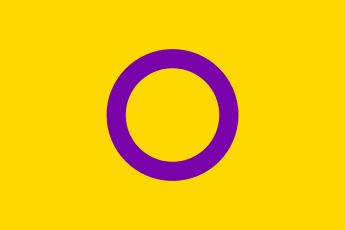

Yellow: disability caused by natural differences. Models like the affirmative model and evolutionary models which view disability as providing positive benefits to individuals and/or society.
The specific golden yellow (#FDD70A): comes from the intersex flag (2013). Intersex is an umbrella term for natural bodily variations that don't neatly conform to ideas of "male" or "female". As a result we are medicalized when there is nothing actually wrong with us. (We intersex folks also belong to the queer community because of how we threaten binary ideas about sex/gender.)
Gold also appears on the Eros Recio disability flag (2017). More recently (2018), gold has become associated with autism, another natural difference.


White: disability caused by unknown or other factors. Models like the human rights model, which focus on how disabled people - regardless of how or why they are disabled - are deserving of basic human/civil rights and liberties.
The specific white (#FFFFFF) is from the neurodiversity flag. I have been unable to track down the first one from 2005 but a large variety of rainbow infinities on white backgrounds have been used ever since for neurodiversity.
Neurodiversity is a large umbrella category, and can be caused by many factors.
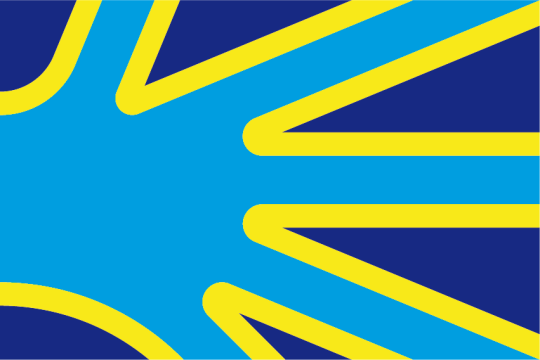
Blue: situational disabilities. Models like the social model and the radical model which posit there is nothing wrong with us. The problem is how society excludes us.
The specific blue (#009ee0) comes from the Deaf flag (2011). Many Deaf people feel there is nothing wrong with being Deaf, the problem is that the rest of society does not use signed languages, provide captions & transcripts, etc.
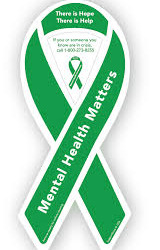
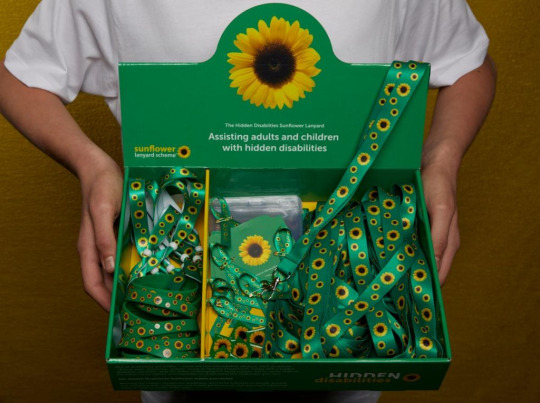
Green: disability due to natural illness. By "natural" I mean not socially imposed like how how treatable diseases are allowed to persist due to sociopolitical oppression/neglect. This is associated with medical models of disability.
Honestly I struggled for a historical flag for green - seems green is not a colour that disabled organizers seem to have been using until very recently(?). There are a bunch of green awareness ribbons from the 00s such as for kidney cancer, mitochondrial disease, hepatits B, and lyme disease. But I could not find evidence that any of them were made by the people with the relevant disabilities.
If anybody knows of any disability-led designs that prominently feature green that were used before ~2016 please let me know!
Green has been used as a colour for mental illness since at least 2013, and judging from my google image search results for "green ribbon awareness" this has been the most popular green ribbon awareness campaign.
But everything I can find gives me the impression this green ribbon campaign was created by sane people, though some celebrities who have been open about having mental health problems have backed the campaign.
The green sunflower lanyards used to indicate hidden disabilities started in 2016 in the UK, from which I got this green (#1f9a4b).

Purple: disability as a community. Models like the social construction model which focus on how the category of disability is socially constructed and maintained.
The purple (#82609b) is from the mad pride flag (2013). Mad pride has its origin in the psychiatric survivor movement, which has been critical of how psychiatry defines and punishes madness.
Madness in particularly has a long history of being socially constructed. For example, in how sociopolitical oppression can be twisted into individual pathology: black slaves who fled slavery were diagnosed with "drapetomania" rather than for society to understand slavery as oppression. More recently, terms like "climate anxiety" and "climate grief" have been used to individualize the climate crisis.
Including purple in the place of green in the flag is as a means to include mad pride & mutual aid communities when talking disability history. The five colours of the standard disability pride flag are to symbolize all of humanity, being the most common colours used in national flags.
Swapping out the green for purple for talking about disability history kind of represents how we disabled people have been on our own, not really represented by nation-states.
#disability#disability pride#disability pride month#disabled pride#recoloured flag#flag history#disability history
48 notes
·
View notes
Text
WARNING
This comic contains themes of isolation. If you are sensitive to such, please skip this comic.
If you wish to proceed, comic is under cut.
13ES: I have it loaded from my memory conflux now. ... I apologize if this is upsetting to anyone.
Loading memory from Memory Conflux
Please stand by...
Memory loaded successfully!
. . .

EPS: Misunderstandings are not something I take lightly.
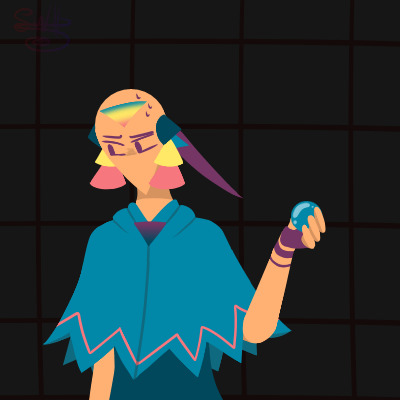
EPS: It's my job to prevent such misunderstandings from my part. I sincerely apologize for such incompetence.

13ES: Prism that's enough, your work does not equal your worth. You don't need to be so hard on yourself because of a simple mishap.
EPS: With all due respect, that doesn't excuse my actions. I know... that... Stories?
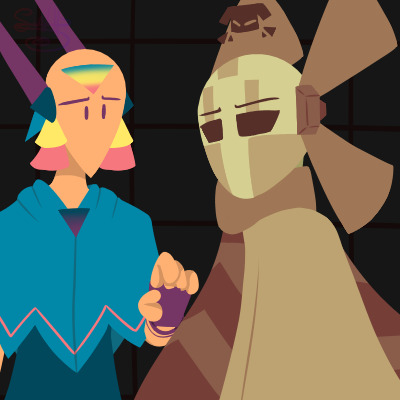
13ES: Prism, something isn't right. The communication towers are... trying to send a signal?
EPS: Stories, your communications are-
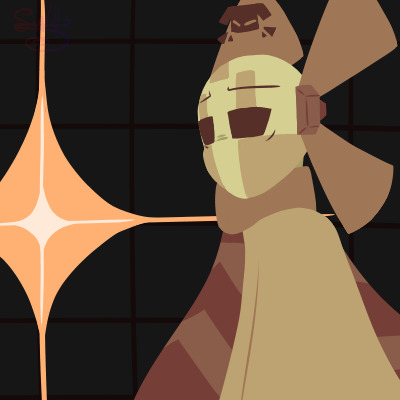
13ES: Prism?!
[LIVE BROADCAST] - [ANNOUNCEMENT] COMMUNICATIONS MANIFEST to Group Alpha
[[ERROR]]
CANNOT OBTAIN LOCAL GROUP ID - ATTEMPTING AGAIN. PLEASE STAND BY...
...
. . .
. . .
[[ERROR]]
LOCAL GROUP ID UNOPTAINABLE - SENIOR ID FOUND
ATTEMPTING TO CONNECT...

13ES: I don't... did the communications break? I don't think it... !
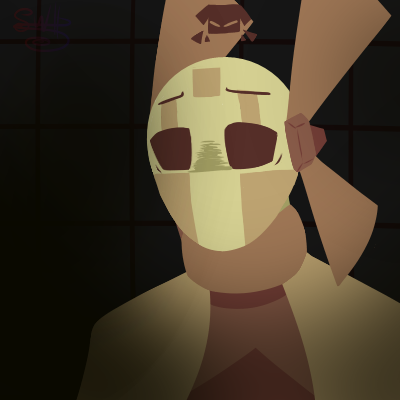

[LIVE BROADCAST] - BROADCAST ANNOUNCEMENT - SLIVER OF STRAW
TRIPLE AFFIRMATIVE
AFFIRMATIVE - THE SOLUTION IS PORTABLE AFFIRMATIVE - THE SOLUTION IS FOUND AFFIRMATIVE - THE TECHNICAL IMPLEMENTATION IS POSSIBLE AND APPLICABLE

13ES: Sliver of Straw? But... what-
[EQUIPMENT MANIFEST] Grabbing data Loading Holograms Please stand by...

13ES: Holograms?! But-
[EQUIPMENT MANIFEST] Thirteen Elder Stories - Second Generation Group Senior of Group Unidentified has been added to hologram announcement
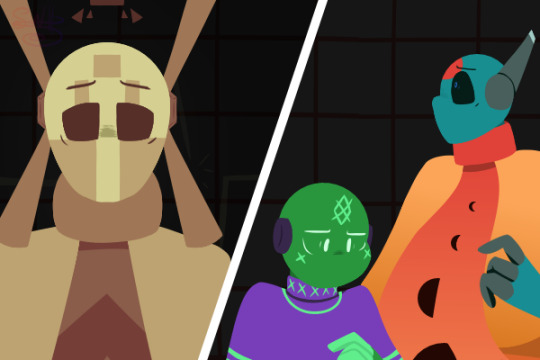
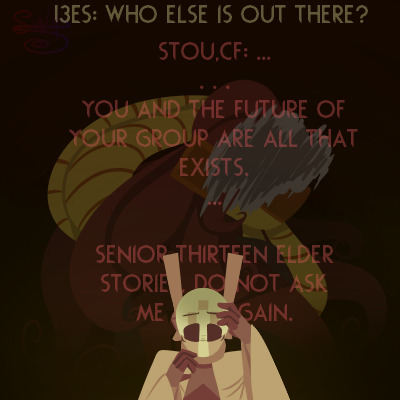
[ 13ES: Who else is out there?
STOU,CF: ... . . . You and the future of your group are all that exists. ... Senior Thirteen Elder Stories, do not ask me this again. ]

13ES: ...
. . .
It was a lie. T-there's more of us out here.
They never...
They... they wanted to keep us behind locked doors... they didn't want us to...
Everything... every single thing. It was all a lie. Everything was nothing but a lie.
[LIVE BROADCAST] - COMMUNICATIONS MANIFEST to Thirteen Elder Stories
[[ERROR]]
ID CODE LOST.
ALL PARTICIPANTS IN BROADCAST ANNONCEMENT BLOCKED.
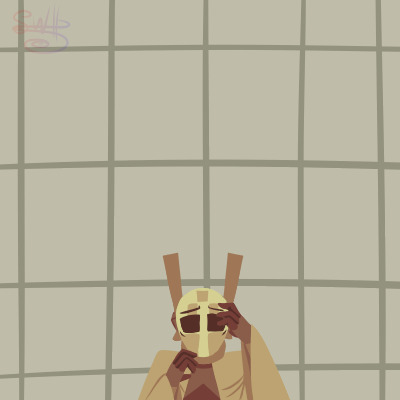
13ES: WAIT!
I...
I never got to even speak to them...
(You can ask questions on this if you'd like)
#rain world#rain world oc#rain world askblog#ga lore#ga comic#isolation#tw isolation#isolation tw#cw isolation#isolation cw#extracted prism sunsets#thirteen elder stories#spiraling tales of uncertainty. countless fates
13 notes
·
View notes